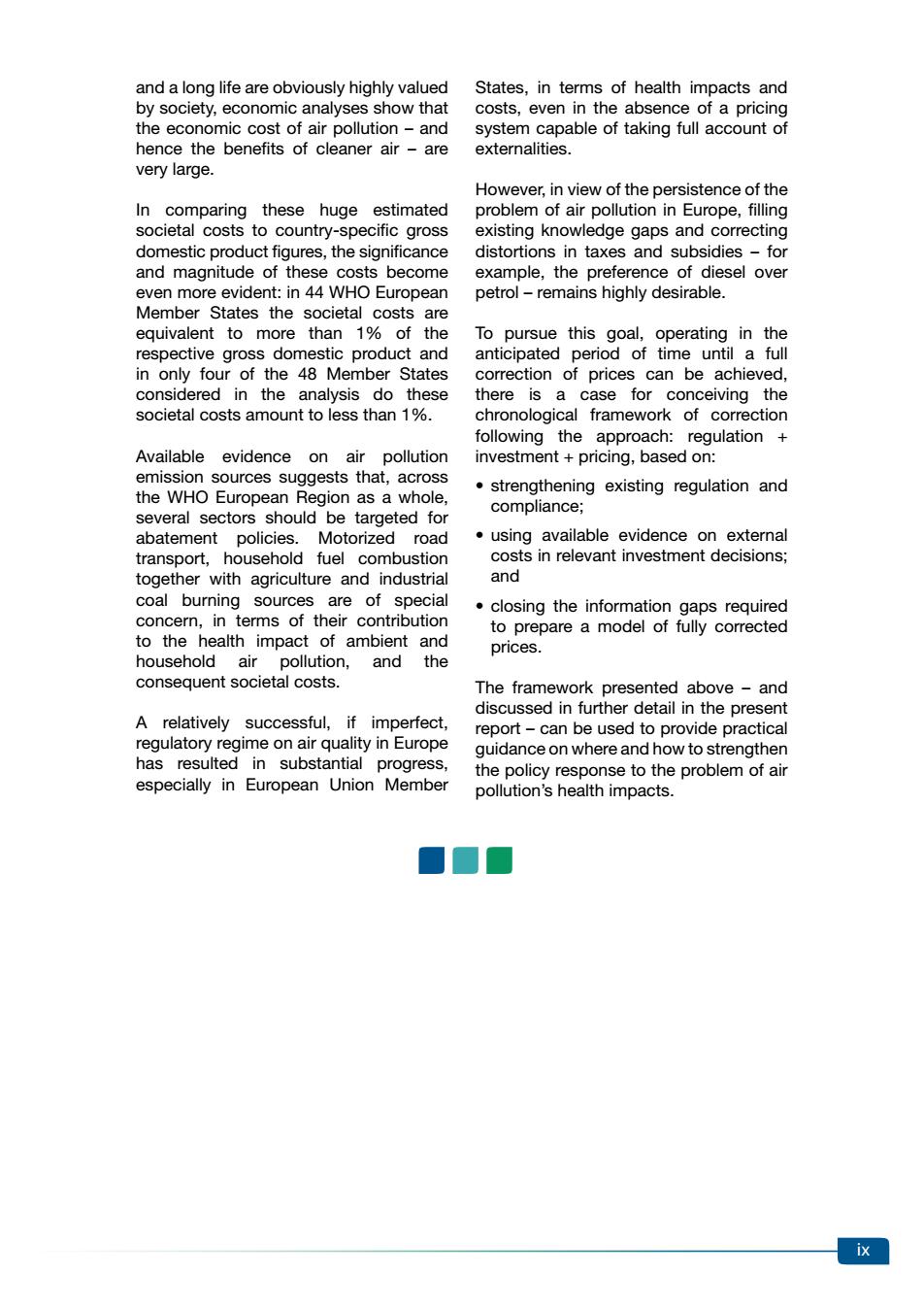正在加载图片...

and a long life are obviously highly valued States,in terms of health impacts and by society,economic analyses show that costs,even in the absence of a pricing the economic cost of air pollution -and system capable of taking full account of hence the benefits of cleaner air-are externalities. very large. However,in view of the persistence of the In comparing these huge estimated problem of air pollution in Europe,filling societal costs to country-specific gross existing knowledge gaps and correcting domestic product figures,the significance distortions in taxes and subsidies-for and magnitude of these costs become example,the preference of diesel over even more evident:in 44 WHO European petrol-remains highly desirable. Member States the societal costs are equivalent to more than 1%of the To pursue this goal,operating in the respective gross domestic product and anticipated period of time until a full in only four of the 48 Member States correction of prices can be achieved, considered in the analysis do these there is a case for conceiving the societal costs amount to less than 1%. chronological framework of correction following the approach:regulation Available evidence on air pollution investment pricing,based on: emission sources suggests that,across the WHO European Region as a whole, strengthening existing regulation and compliance; several sectors should be targeted for abatement policies.Motorized road using available evidence on external transport,household fuel combustion costs in relevant investment decisions; together with agriculture and industrial and coal burning sources are of special closing the information gaps required concern,in terms of their contribution to prepare a model of fully corrected to the health impact of ambient and prices. household air pollution,and the consequent societal costs. The framework presented above-and discussed in further detail in the present A relatively successful,if imperfect, report-can be used to provide practical regulatory regime on air quality in Europe guidance on where and how to strengthen has resulted in substantial progress, the policy response to the problem of air especially in European Union Member pollution's health impacts. ⅸix States, in terms of health impacts and costs, even in the absence of a pricing system capable of taking full account of externalities. However, in view of the persistence of the problem of air pollution in Europe, filling existing knowledge gaps and correcting distortions in taxes and subsidies – for example, the preference of diesel over petrol – remains highly desirable. To pursue this goal, operating in the anticipated period of time until a full correction of prices can be achieved, there is a case for conceiving the chronological framework of correction following the approach: regulation + investment + pricing, based on: • strengthening existing regulation and compliance; • using available evidence on external costs in relevant investment decisions; and • closing the information gaps required to prepare a model of fully corrected prices. The framework presented above – and discussed in further detail in the present report – can be used to provide practical guidance on where and how to strengthen the policy response to the problem of air pollution’s health impacts. and a long life are obviously highly valued by society, economic analyses show that the economic cost of air pollution – and hence the benefits of cleaner air – are very large. In comparing these huge estimated societal costs to country-specific gross domestic product figures, the significance and magnitude of these costs become even more evident: in 44 WHO European Member States the societal costs are equivalent to more than 1% of the respective gross domestic product and in only four of the 48 Member States considered in the analysis do these societal costs amount to less than 1%. Available evidence on air pollution emission sources suggests that, across the WHO European Region as a whole, several sectors should be targeted for abatement policies. Motorized road transport, household fuel combustion together with agriculture and industrial coal burning sources are of special concern, in terms of their contribution to the health impact of ambient and household air pollution, and the consequent societal costs. A relatively successful, if imperfect, regulatory regime on air quality in Europe has resulted in substantial progress, especially in European Union Member